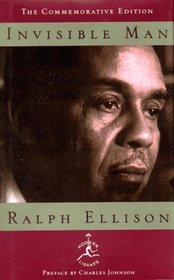Helpful Score: 1
"...one of the greatest jokes in the world is the spectacle of the whites busy escaping blackness and becoming blacker every day, and the blacks striving toward whiteness, becoming quite dull and gray."
Ellison is certainly a skilled writer and his prose impressive (his dialogue, not so much). The story is expertly layered with imagery, metaphors, and foreshadowing. I appreciate some of his more blatant imagery (such as the kneeling slave statue or his infamous paint mixing scene). I am glad to have read such an African American classic, such an acclaimed social commentary... but it will be the last.
I have found this book to be more tedius than entertaining; more garrulous than insightful. There are many gaping holes in the storyline which I understand were left to mystery purposefully by the author, but instead of intriguing the plot, it was confusing this reader. Perhaps Ellison's language is too subtle for me to grasp or too sophisticated for my palate. For a subject as powerful and personal as racism, it fell short of the claims made on it.
A fellow goodreads user (Nathaniel Calhoun) said it best in his review:
'This is strongly reminiscent of German Expressionist drama from the early 20th century. It suffers from an inability to actually characterize anyone beyond the protagonist. Every other character is crushed by the need to represent a whole class or demographic. All of the other figures are episodes in his life, his personal development, his realization of society's deep-seated decay and his inexorable (and predictable) movement towards disillusionment. Which is to say that it is a heavy-handed, young, stereotype filled book.
Yes, it is a worthy historical object. Yes, it is an interesting foil to other pieces of American literature (which does not have too many books of this variety); but I don't think it deserves great praise if it is judged on its own merits. The prose is nothing special, the dialect isn't handled with particular grace, it has an irritating tendency to state the obvious and to self-interpret and the author actually takes the time to call attention to the fact that he is choosing to rant at you for the last five pages--a total admission of weakness.
I am, however, giving it two stars in the "it was okay" sort of fashion. I'm not upset that I read it. I just won't read it again, teach it or reccommend it to anyone.'
Ellison is certainly a skilled writer and his prose impressive (his dialogue, not so much). The story is expertly layered with imagery, metaphors, and foreshadowing. I appreciate some of his more blatant imagery (such as the kneeling slave statue or his infamous paint mixing scene). I am glad to have read such an African American classic, such an acclaimed social commentary... but it will be the last.
I have found this book to be more tedius than entertaining; more garrulous than insightful. There are many gaping holes in the storyline which I understand were left to mystery purposefully by the author, but instead of intriguing the plot, it was confusing this reader. Perhaps Ellison's language is too subtle for me to grasp or too sophisticated for my palate. For a subject as powerful and personal as racism, it fell short of the claims made on it.
A fellow goodreads user (Nathaniel Calhoun) said it best in his review:
'This is strongly reminiscent of German Expressionist drama from the early 20th century. It suffers from an inability to actually characterize anyone beyond the protagonist. Every other character is crushed by the need to represent a whole class or demographic. All of the other figures are episodes in his life, his personal development, his realization of society's deep-seated decay and his inexorable (and predictable) movement towards disillusionment. Which is to say that it is a heavy-handed, young, stereotype filled book.
Yes, it is a worthy historical object. Yes, it is an interesting foil to other pieces of American literature (which does not have too many books of this variety); but I don't think it deserves great praise if it is judged on its own merits. The prose is nothing special, the dialect isn't handled with particular grace, it has an irritating tendency to state the obvious and to self-interpret and the author actually takes the time to call attention to the fact that he is choosing to rant at you for the last five pages--a total admission of weakness.
I am, however, giving it two stars in the "it was okay" sort of fashion. I'm not upset that I read it. I just won't read it again, teach it or reccommend it to anyone.'




![header=[] body=[Get a free book credit right now by joining the club and listing 5 books you have and are willing to share with other members!] Help icon](/images/question.gif?v=90afaeb39)
